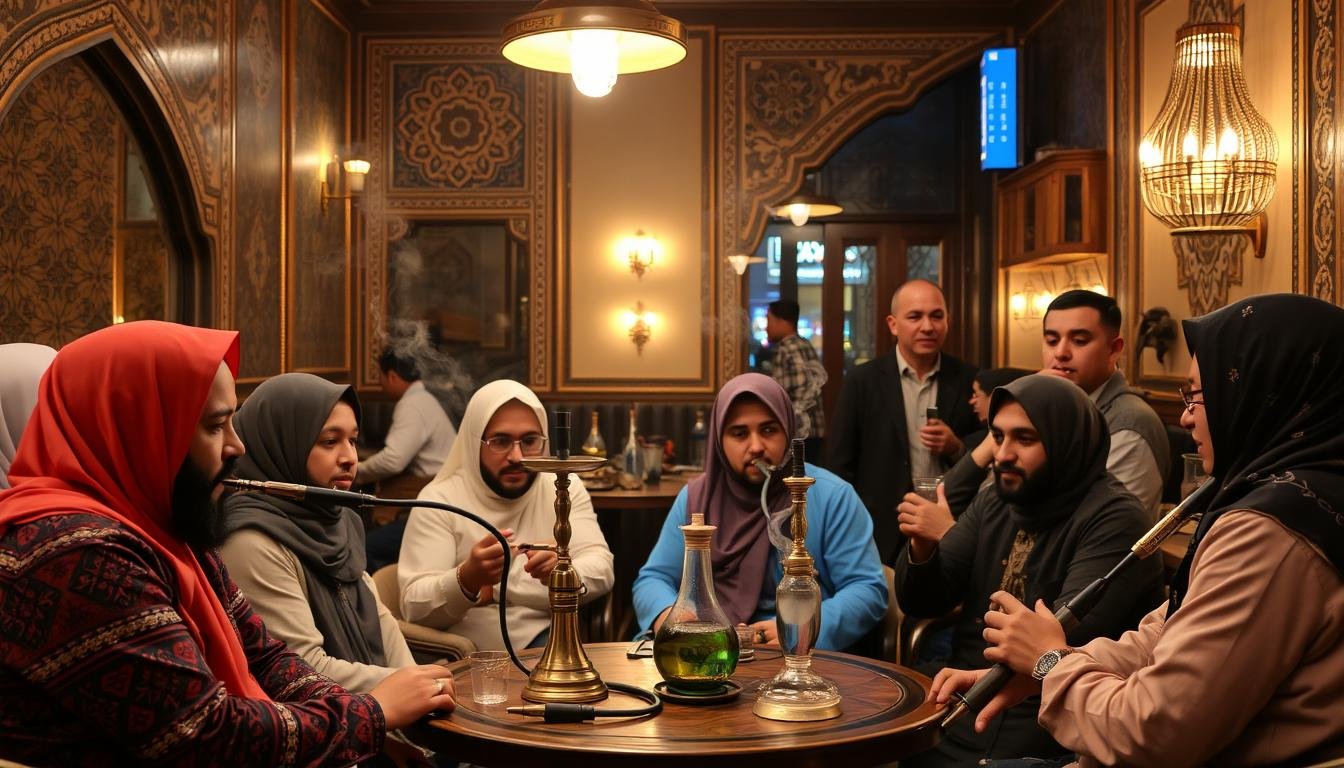Is smoking a choice that clashes with Islamic values? The debate on Muslims smoking brings up big questions about health, faith, and culture. We’ll look into how Islam views smoking, check out different fatwas, and see what scholars think today. This topic makes us think more about what we believe and why.
The Islamic Perspective on Smoking
Islamic views on smoking show a mix of culture and faith. Smoking isn’t directly talked about in the Quran or hadith. Yet, many scholars worry about its dangers. They see tobacco as possibly harmful, sparking debate in Muslim communities about if it’s okay.
Understanding Harms and Benefits
Some say smoking has social or cultural perks. But most believe its harms outweigh these benefits. Health issues like lung diseases and a higher cancer risk have made scholars call smoking haram. This is why teaching about these risks is key in Islamic teachings.
Historical Context of Smoking in Islam
Smoking’s history in Islam goes back to when tobacco came to the Muslim world. Reactions were all over the place, with some places accepting it and others not. The first ban on smoking came from Morocco in 1602, showing early worries about its dangers.
These early warnings show a growing concern about health risks. Yet, Muslims have a complex view of smoking across different places.
Fatwas and Smoking
Fatwas on smoking have greatly influenced how Muslims view its use. They reflect deep concerns about health and well-being. This has shaped how Muslims think about smoking.
Significant Fatwas Against Smoking
Many Islamic scholars have spoken out against smoking. They see it as harmful to health. Some even call it a major sin.
This view matches the growing awareness of smoking’s health risks. Religious leaders strongly advise against it. They believe it goes against the values of preserving life and health.
This has made these views widely accepted among Muslims.
Variations by Region and Authority
There are differences in how smoking is viewed in different places. Some Islamic leaders discourage it but don’t ban it. Others say you must stop smoking completely.
This depends on local culture and how Islamic texts are interpreted. In some areas, leaders warn about smoking’s dangers. In others, it’s seen as okay.
Can Muslims Smoke?

There’s a lot of talk about smoking in Muslim communities. It’s about religious beliefs, health, and social issues. Scholars are now more against smoking because it can harm people. They say Muslims should follow teachings that promote a healthy lifestyle.
Current Scholarly Views
Today, many scholars say smoking is bad because of health risks. Studies show smoking can lead to serious health problems. They urge Muslims to stop using tobacco because it goes against Islamic values that value health and life.
Health Risks and Religious Teachings
Islamic teachings stress the need for good health and avoiding harmful habits. Smoking can cause cancer, lung diseases, and heart problems. Islamic leaders are working hard to warn the community about smoking’s dangers. They say it goes against Islamic teachings that encourage health and strength.
Effects of Smoking on Health
It’s important to understand how smoking affects public health. Smoking harms not just the person who smokes, but also the community. Diseases like lung cancer and heart problems show the big risks of smoking.
These illnesses not only affect smokers but also put a heavy load on healthcare. This is a big issue for both people and healthcare systems.
Common Health Risks Associated with Smoking
Smoking is linked to many serious diseases. Lung cancer is a top concern for smokers. Smoking also leads to COPD and heart disease.
When harmful substances from smoke get into the body, they harm both smokers and those around them. This makes it crucial to tackle these risks quickly.
Impact of Smoking on Community Health
Smoking affects community health in many ways. It raises medical costs for treating smoking-related illnesses. It also hurts the economy by causing lost productivity and overloading public health services.
This shows why we need strong prevention and education efforts. It’s key to fight the health and economic problems smoking causes.
You may also be interested in:
Social Attitudes Towards Smoking Among Muslims
Social attitudes on smoking among Muslims change a lot across different places and cultures. These views affect how Muslims smoke and show a mix of cultural rules and Islamic teachings. It helps us see how community views affect smoking habits.
Regional Differences in Smoking Habits
In many places, smoking habits among Muslims show unique traits based on local ways and social life. For example, in some Middle Eastern countries, smoking is okay in social circles. But in other areas, there’s a strict rule against smoking, following Islamic teachings.
Influence of Islamic Teachings
Islamic teachings greatly shape opinions and actions in the Muslim community. Religious leaders talk about how bad tobacco is for health. This advice changes how people see smoking, making it not just a personal choice but also a religious and community issue.
Tobacco Use Trends in Muslim Countries
Recent studies show big changes in how Muslims use tobacco. Surveys show some countries are using more tobacco, while others are using less. This shows a complex picture of tobacco use across different places. Things like culture, money, and health efforts affect these trends a lot.
Surveys on Smoking Rates
Studies show that smoking rates vary a lot in Muslim countries. Some countries are seeing a drop in smoking, while others are seeing more people start. These findings show how complex tobacco use is. They reflect local views and the impact of global health trends.
Changing Perspectives Over Time
Views on smoking are changing in Muslim societies today. More people know about health risks, leading to a move away from smoking. This shift is thanks to health campaigns, making more people see smoking as harmful. It’s part of a push for healthier living in Muslim communities.
The Role of Education in Smoking Prevention
Education is key in stopping smoking, making people aware of health risks. Programs teach the dangers of smoking to both young and old. They use schools, community centers, and the internet to spread the word.
Awareness Programs on Health Risks
Workshops and seminars teach people about smoking’s health risks. This helps people see smoking as a bad choice. Creative methods like social media and visuals help reach more people and promote health.
Religious Campaigns Against Smoking
Religious groups help fight smoking in many communities. They use Islamic teachings to stress the need for health and wellness. This approach makes smoking seen as harmful to both personal and community health. Together, religious and secular efforts boost the fight against smoking.
Religious Context: Wastefulness and Harm
Islamic teachings offer a deep look at wastefulness, matching the Quran’s views. The Quran teaches us not to waste resources but to use them wisely. It also warns against the harm caused by smoking, seeing it as a waste of life’s gifts. This shows how managing resources and our actions ties to living ethically, as taught in Islamic texts.
The Quranic View on Squandering Resources
The Quran guides us to be careful with our resources. It teaches us to take care of what we have and warns against wasting things. Actions like smoking go against this advice by harming us and wasting resources. Understanding the Quran’s stance on wastefulness helps us see the right way to live, especially in our health choices.
Islamic Principles Against Causing Harm
Islamic teachings tell us to avoid harming ourselves or others. This is very true for smoking, which harms the smoker and those around them with secondhand smoke. This fits with Islam’s goal of keeping everyone healthy. Living by these principles means we aim for healthier lives, following the teachings of Islam.
Conclusion: A Summary of Perspectives
Looking at Muslim views on smoking, we see a complex and varied discussion. Different interpretations of religious texts, health effects, and cultural views shape these opinions. As health risks of smoking in Islam become clearer, so does the community’s stance.
Recent studies show more awareness of smoking’s health dangers. This awareness is making many groups link Islamic teachings with health campaigns. A study in England found a link between religious beliefs and smoking habits. It shows the need for specific tobacco control efforts and a better grasp of smoking issues and a deeper understanding.
As cultural views change and health education spreads, many areas are moving toward stricter tobacco rules. This shift highlights the value of health and well-being. It matches Islamic values of protecting life and avoiding harm. This change shows a big shift in how Muslims view smoking.
FAQ
Can Muslims Smoke?
Are there any historical fatwas against smoking in Islam?
What health risks are associated with smoking according to Islamic teachings?
How do social attitudes toward smoking differ among Muslims?
What are the trends in tobacco use among Muslim populations?
How is education playing a role in smoking prevention among Muslims?
What does the Quran say about wastefulness and harm in relation to smoking?

Embracing Faith, One Insight at a Time!
The teachings of the Quran have always guided my path. With a deep passion for Islamic knowledge, I strive to blend the wisdom of tradition with the relevance of today, making the timeless messages of Islam accessible and meaningful for everyone.
Muslim Culture Hub is my platform to share historical insights and thought-provoking articles, exploring both well-known and lesser-discussed aspects of Islamic culture and beliefs. My mission is to create an inclusive online space where everyone can learn, strengthen their faith, and connect with the profound message of Islam.
Join the journey!
May peace be upon you.







